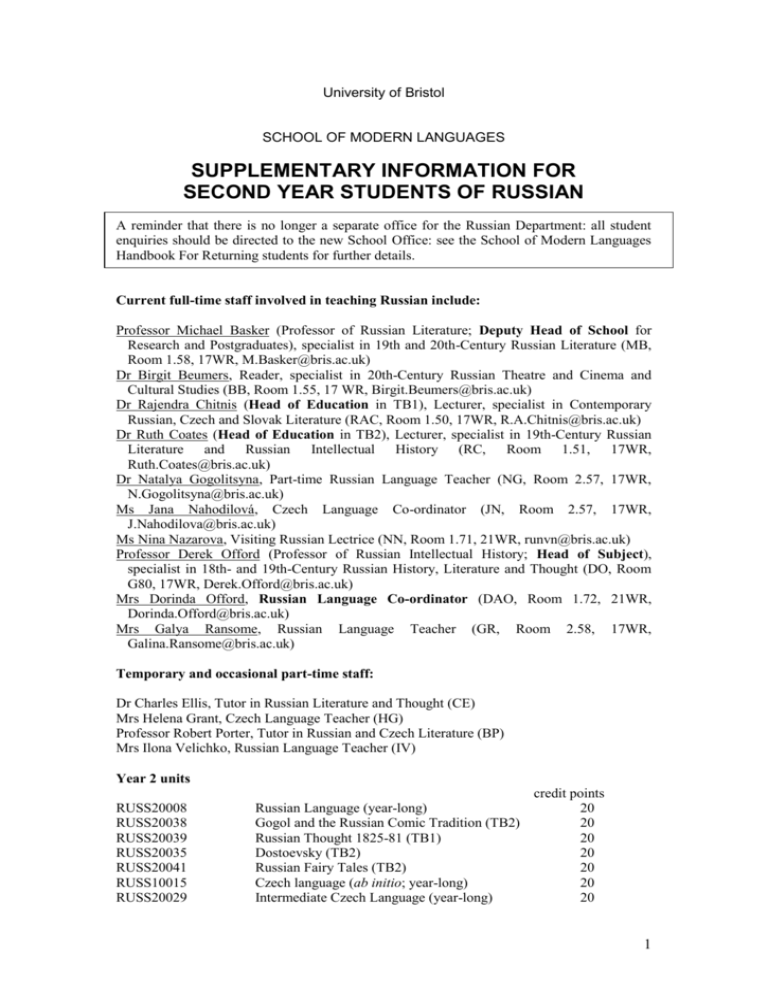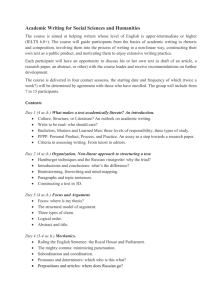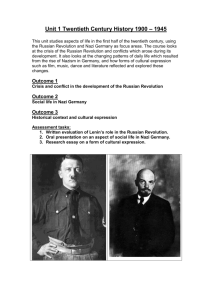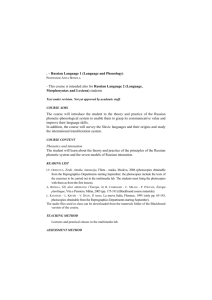RUSS20038 Gogol and the Russian Comic Tradition (TB2) 20
advertisement

University of Bristol SCHOOL OF MODERN LANGUAGES SUPPLEMENTARY INFORMATION FOR SECOND YEAR STUDENTS OF RUSSIAN A reminder that there is no longer a separate office for the Russian Department: all student enquiries should be directed to the new School Office: see the School of Modern Languages Handbook For Returning students for further details. Current full-time staff involved in teaching Russian include: Professor Michael Basker (Professor of Russian Literature; Deputy Head of School for Research and Postgraduates), specialist in 19th and 20th-Century Russian Literature (MB, Room 1.58, 17WR, M.Basker@bris.ac.uk) Dr Birgit Beumers, Reader, specialist in 20th-Century Russian Theatre and Cinema and Cultural Studies (BB, Room 1.55, 17 WR, Birgit.Beumers@bris.ac.uk) Dr Rajendra Chitnis (Head of Education in TB1), Lecturer, specialist in Contemporary Russian, Czech and Slovak Literature (RAC, Room 1.50, 17WR, R.A.Chitnis@bris.ac.uk) Dr Ruth Coates (Head of Education in TB2), Lecturer, specialist in 19th-Century Russian Literature and Russian Intellectual History (RC, Room 1.51, 17WR, Ruth.Coates@bris.ac.uk) Dr Natalya Gogolitsyna, Part-time Russian Language Teacher (NG, Room 2.57, 17WR, N.Gogolitsyna@bris.ac.uk) Ms Jana Nahodilová, Czech Language Co-ordinator (JN, Room 2.57, 17WR, J.Nahodilova@bris.ac.uk) Ms Nina Nazarova, Visiting Russian Lectrice (NN, Room 1.71, 21WR, runvn@bris.ac.uk) Professor Derek Offord (Professor of Russian Intellectual History; Head of Subject), specialist in 18th- and 19th-Century Russian History, Literature and Thought (DO, Room G80, 17WR, Derek.Offord@bris.ac.uk) Mrs Dorinda Offord, Russian Language Co-ordinator (DAO, Room 1.72, 21WR, Dorinda.Offord@bris.ac.uk) Mrs Galya Ransome, Russian Language Teacher (GR, Room 2.58, 17WR, Galina.Ransome@bris.ac.uk) Temporary and occasional part-time staff: Dr Charles Ellis, Tutor in Russian Literature and Thought (CE) Mrs Helena Grant, Czech Language Teacher (HG) Professor Robert Porter, Tutor in Russian and Czech Literature (BP) Mrs Ilona Velichko, Russian Language Teacher (IV) Year 2 units RUSS20008 RUSS20038 RUSS20039 RUSS20035 RUSS20041 RUSS10015 RUSS20029 credit points Russian Language (year-long) 20 Gogol and the Russian Comic Tradition (TB2) 20 Russian Thought 1825-81 (TB1) 20 Dostoevsky (TB2) 20 Russian Fairy Tales (TB2) 20 Czech language (ab initio; year-long) 20 Intermediate Czech Language (year-long) 20 1 Structure of Year 2 programme (a) All second-year students follow the same core language unit (20 credit points). The same level of language attainment will eventually be expected of all students, irrespective of their level of Russian at entry to the first year and irrespective of choices they make in Years 2 and 4 about non-linguistic units in the departments in which they are based. (b) Remaining units on the Russian programme are selected from the list of options set out above. Single Honours students follow the mandatory language unit and a sufficient number of the remaining optional units listed above to achieve at least 100 of the required credit points for Year 2. The additional 20 credits may also be taken in the Russian Department or may be gained from Open Units taken outside the Department. Students in the School of Modern Languages must take units worth at least 40 credits (including 20 for language) and may also follow optional units giving them a total of up to 80 credit points on the Russian side of their programme. The balance of the 120 credit points that must be gained in Year 2 come from units in their other language department. Students in Joint Schools involving a department outside the School of Modern Languages (Russian and History of Art, Russian and Philosophy, Russian and Politics) take the mandatory language unit plus two units from the list of options, giving a total of 60 on the Russian side of the programme. All students (i.e. Joint as well as Single Honours) may if they wish follow a unit on Teaching English as a Foreign Language mounted by the Language Centre. This option may be of interest to any students who intend to take up a placement during their year abroad which would involve an element of English teaching in a foreign institution. Routine queries in connection with this academic programme should normally be addressed in the first instance to the Director of the unit in question or to the Head of Education. Second-year examinations and assessment scheme Russian Language The language examination at the end of Year 2 is a sessional examination. That is to say the mark awarded for it does not contribute to the degree result but the examination must be passed (the minimum pass mark is 40%) if the student is to gain the 20 credit points attached to the second-year language unit and is to progress in the normal way to the Year Abroad. In the event of failure in the language examination the student must take and pass a resit in early September in order to proceed to the Russian part of the Year Abroad. The overall language mark for the second year is derived from the marks for four different types of assessment: (i) (ii) (iii) (iv) an end-of-year written examination (50% of the total) an end-of-year oral/aural examination (20% of the total) a grammar test at the end of TB1 (10% of the total) two writing tasks set at the end of TB1 and TB2 (20% of the total) 2 The second-year written examination is a three-hour paper consisting of: (i) (ii) (iii) (iv) a grammar test Russian-English translation English-Russian translation reading comprehension The oral/aural examination consists of: (i) (ii) (iii) (j) reading an oral task free conversation an aural comprehension test Work done in the second-year language classes will prepare students for these tests. It is therefore of the utmost importance that students attend all language classes and carry out all assignments set in them. Czech Language For second-year students of Russian taking ab initio Czech Language or Intermediate Czech Language as one of their options within their Russian programme the assessment is by a three-hour written examination and a fifteen-minute oral examination in the Summer Term. 3







